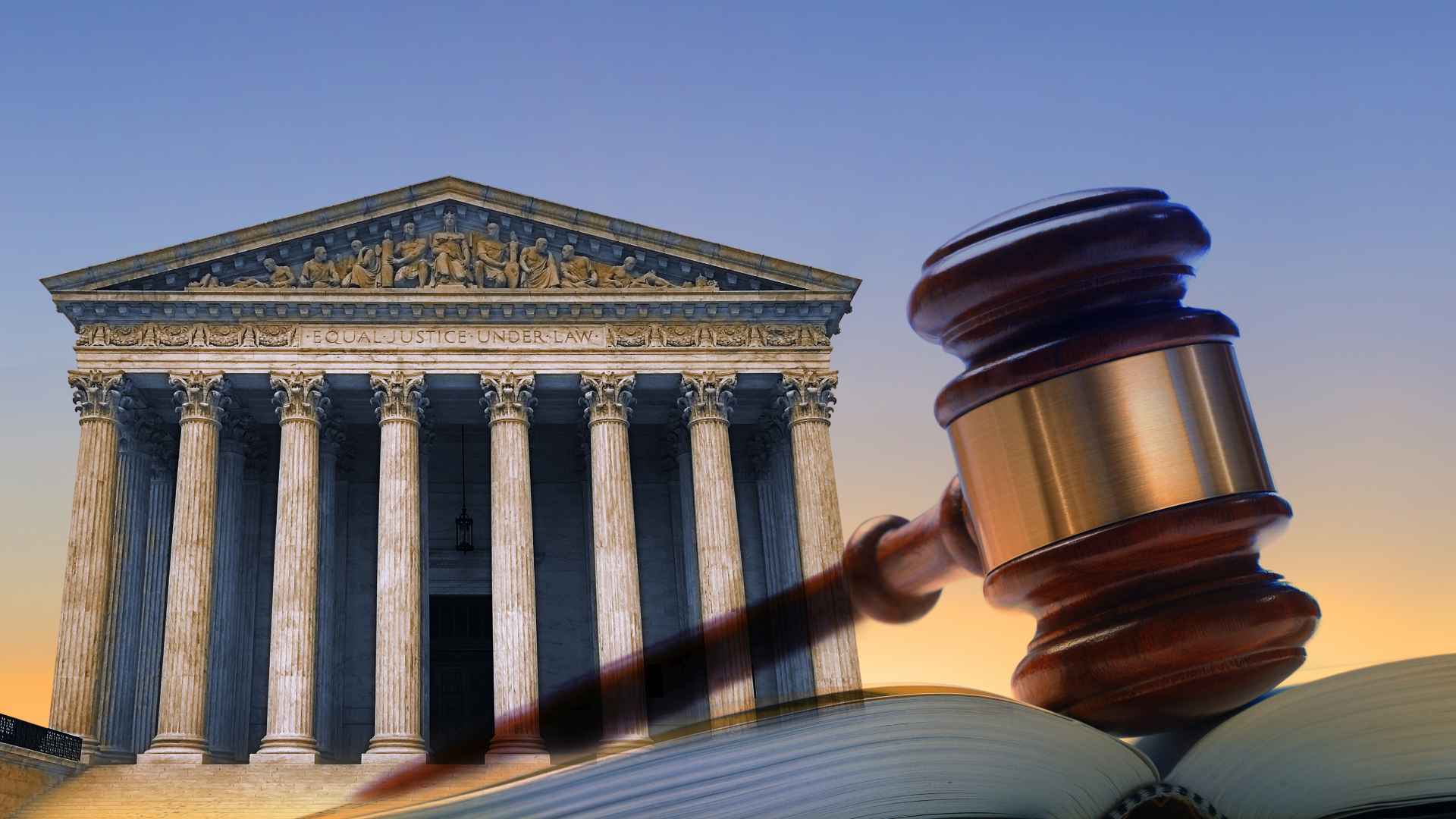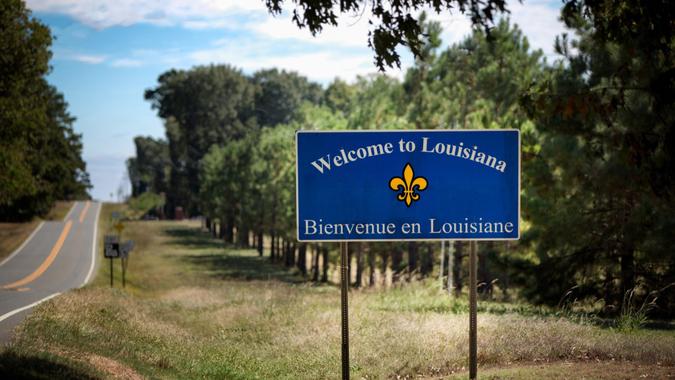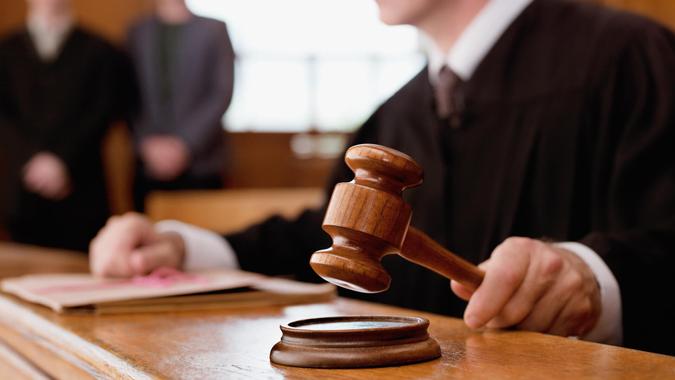
While the Supreme Court is the highest power of America’s judicial branch, it might not be thought of as a force that dictates economic policy. However, many of the Court’s decisions — particularly those related to the tax system — can definitely have an impact on your wallet.
Check Out: I Asked ChatGPT What Trump’s ‘Big Beautiful Bill’ Means for Retirees’ Taxes: Here’s What It Said
Also See: 6 Popular SUVs That Aren't Worth the Cost -- and 6 Affordable Alternatives
As Shane Lucado, attorney and founder/CEO of InPerSuit, told GOBankingRates, “When the Supreme Court turns policy into precedent, it rattles risk forecasts, freezes capital and creates trillions in downstream effects that are rarely accounted for in the headlines. … That ripple affects capital markets within hours, pricing strategies within days and litigation exposure within weeks.”
Below are a few cases from the highest court’s 2024-25 term, as well as cases from the upcoming term, that could affect your wallet.

Catholic Charities Bureau, Inc. v. Wisconsin Labor & Industry Review Commission
In this case, SCOTUS unanimously decided that the state of Wisconsin had violated the First Amendment when it denied tax exemptions to the Catholic Charities Bureau (CCB). Initially, Wisconsin had denied tax exemption because the CCB, while a religious organization, did not actively proselytize Catholicism. SCOTUS ruled that denying tax exemptions to religious organizations that choose not to proselytize is a form of discrimination and a violation of First Amendment rights.
Bishop James Powers said the ruling enables the church “to continue serving those in need.”
On a larger scale, the decision could cause revenue losses for states as a result of more nonprofit organizations being able to claim religious tax exceptions (which increases the taxpayer burden of others), as well as allow for costly litigation against states that similarly discriminate against organizations like the CCB.
According to a 2021 Tax Foundation study, religious exemptions already cost the federal government — and thus taxpayers — $2.4 billion annually.
See More: Here’s How Much Every Tax Bracket Would Gain — or Lose — Under Trump’s ‘Big, Beautiful Bill’
Also Read: Trump Wants To Eliminate Income Taxes — Here’s How Long Experts Think It Could Take

Commissioner v. Zuch
On June 12, 2025, SCOTUS ruled to limit taxpayer access to the U.S. Tax Court. Essentially, the Tax Court cannot oversee IRS collection disputes once the debt has been settled — such as through a refund offset, as happened in this case. Taxpayers must challenge refund offsets in federal district court instead — which can cost a lot more and be prohibitive for people without the financial means to advance such a legal challenge.
Chad D. Cummings, attorney and CPA at Cummings & Cummings Law, told GOBankingRates that the decision “gives the IRS a procedural advantage by allowing it to cut off Tax Court review through internal adjustment. As a result, taxpayers will have less time to request hearings or file petitions, making early engagement with counsel and prompt filing of Tax Court petitions more critical than ever.”
Discover More: 8 Ways Trump’s ‘One Big Beautiful Bill’ Could Offer Tax Relief

D.V.D. v. Department of Homeland Security
This is an instance in which SCOTUS ruled in favor of the Trump administration, allowing for the White House’s continued push for the deportation of undocumented immigrants. Specifically, the SCOTUS ruling undoes a lower court order that blocked Trump’s administration from deporting undocumented immigrants to other countries (not their countries of origin) without first allowing the immigrants to make the case that such deportations might lead to persecution or death.
While a clear victory for Trump and the Department of Homeland Security’s continued efforts to curtail undocumented immigration, these mass deportations also could have a deleterious impact on the average American’s wallet.
As the Herman Legal Group has reported, an increase in immigration enforcement typically leads to labor shortages, specifically in the fields of agriculture, construction, restaurants and hospitality, housing and cleaning, and factories and manufacturing. Such labor shortages create decreased production and disrupted supply chains. The ultimate result of all that? Consumers pay more for groceries, for meals at a restaurant, for construction costs and more.
The Herman Legal Group suggests the loss of immigrant workers could lead to “federal and state tax losses in the range of $25 billion annually due to the departure of workers, reduction in consumer spending and the closure of immigrant-owned businesses.”
Trump’s recently passed spending bill earmarks as much as $170 billion for immigration and border security — a cost that taxpayers will shoulder for the rest of the decade.

Loper Bright Enterprises v. Raimondo
In this case, SCOTUS overturned a previous 1984 ruling, Chevron v. Natural Resources Defense Council, holding that courts are no longer required to defer to federal agencies’ interpretations of ambiguous laws.
Only judges can decide what laws mean, in an effort to prevent bureaucrats from shaping the laws.
This could create a wave of costly litigation challenging various previously established federal regulations, especially in the realms of health care, labor, consumer rights and environmental protection. It also could lead to reductions in the enforcement of things like worker safety, healthcare and student loans.
As the Public Health Law Center at Mitchell Hamline School of Law has noted, the ruling “will impact the work of federal agencies like the Centers for Disease Control and Prevention and the Food and Drug Administration, likely making it more difficult for such agencies to pass important regulations that protect public health.” This could lead to increased healthcare costs or even expensive lawsuits if legally actionable public health outbreaks were to occur.

Moore v. United States
In Moore v. United States, SCOTUS ruled that the Mandatory Repatriation Tax (a one-time tax on foreign company profits) is constitutional, even if the taxpayer never receives income from the profits being taxed.
Chad D. Cummings, attorney and CPA, made clear to GOBankingRates that this ruling “cements existing MRT liabilities and underscores the necessity of maintaining liquidity for tax obligations that may arise without a corresponding cash distribution. … Individuals with substantial foreign holdings, closely held businesses or large investment portfolios should view this as a prompt to revisit tax strategies now, before similar measures are enacted that could impose significant, unexpected financial obligations.”
Find More: 41 States That Won’t Tax Social Security Benefits in 2025

TikTok Inc. v. Garland
By unanimous decision, SCOTUS upheld the Protecting Americans from Foreign Adversary Controlled Applications Act. At its core, this SCOTUS decision will force ByteDance, the Chinese owner of TikTok, to sell off the social media platform. If ByteDance does not sell, TikTok will be permanently banned in the U.S., making it inaccessible in America to over 170 million users (including many influencers who profit from the app).
President Trump has continually extended the deadline, which is currently Sept. 17, 2025.
A TikTok ban could be devastating to the social media influencers who have monetized the platform. A recent Ziprecruiter study found that the average successful American TikTok influencer makes approximately $132,000 per year via the app. In America in 2023, TikTok reportedly generated approximately $16 billion in revenue.
Speaking to GOBankingRates about other consequences of a TikTok ban, Sapana Grossi, managing partner in venture capital at the Shah Grossi Law Firm, said TikTok’s absence would be especially hard on micro-brands, “because it will be much more expensive to operate.”
“When the platform went down for a short time earlier this year, the ad prices on other platforms spiked almost immediately,” Grossi said. “For example, the price for impressions on Meta shot up by 10%. Based on that experience, we know that a ban could raise advertising costs significantly and make it almost impossible for micro-brands, or brands that entirely rely on TikTok’s algorithm, to stay in business.”

Cox Communications, Inc. v. Sony Music Entertainment
In the Supreme Court’s upcoming session (which begins in October), the Court will hear Cox Communications, Inc. v. Sony Music Entertainment. Sony (among others) has sued Cox Communications, accusing the telecommunications giant of enabling copyright infringement via its customers, some of whom engage in illegal file sharing while utilizing Cox’s internet service. Sony maintains Cox has not done enough to prevent such criminality across its broadband service.
Even if Cox wins, the case will be a costly one, forcing the company to potentially spend millions to defend itself. Yet if it loses, Grossi told GOBankingRates, “Customers should expect to pay more as (Cox) will likely offset their increased expenses. (Cox) would essentially be acting as online police and monitoring accounts aggressively …(cutting) off households and public networks due to illegal activity by someone on the network.
“As a result, (Cox) will have to invest in larger compliance staff, monitoring/filtering software, and in-house legal departments to deal with a rise in litigation. It’s very likely they will try to recover these costs through a quiet steady climb through higher monthly rates, administrative fees and reconnection charges. … Such fees rarely disappear, which means that a broad ruling here could lock in higher internet costs for years to come.”
Cox’s current internet connection plans range from $50 to $100 per month — whether those prices remain the same could hinge on this case.

Landor v. Louisiana Department of Corrections and Public Safety
This 2025-26 session case seeks to determine whether a person may sue a government official — rather than the governmental body that official works for — over violations of federal law regarding the religious rights of incarcerated criminals. The case stems from Damon Landor, a practicing Rastafarian who was forced by his prison’s warden to have his dreadlocks cut off. As a result, Landor has argued in federal court that his religious rights were violated by the warden.
If Landor were to win, it’s possible that the taxpayer burden could be increased to cover the legal defense costs of government officials. Currently, the Prison Policy Initiative estimates the total U.S. government cost of prisons and jails to be $80.7 billion yearly.
Also See: Here’s How Much Your State Collects on Every Type of Tax

Louisiana v. Callais
Louisiana v. Callais is a 2025-26 redistricting case that will dictate the state of Louisiana’s congressional map going forward by deciding whether the creation of a second majority-Black congressional district in 2024 is a Constitutional violation or if it upholds the Equal Protection Clause of the 14th Amendment and the Voting Rights Act.
After the 2020 census, Louisiana drafted a congressional map with six districts. Black voters made up the majority of only one district in that map, despite the fact that approximately one-third of Louisiana voters are Black. A new map was drawn in 2024, adding a second majority-Black voting district.
This case could have serious political implications, both for Louisiana and other states. Redistricting and gerrymandering is already a deeply contentious issue, with the makeup of congressional maps having the power to determine the outcomes of local, state and national elections.
The financial impacts could be wide ranging. If Black voters are underrepresented, it could lead to less funding for healthcare, social services, etc., in their districts. Uncertainty around voting rights can affect investor sentiment in areas perceived as politically unstable. And the taxpayer costs of these political battles continue to add up.

National Republican Senatorial Committee v. Federal Election Commission
Another case of major financial import is National Republican Senatorial Committee v. Federal Election Commission, in which SCOTUS will decide to uphold or strike down its 2001 ruling in Federal Election Commission v. Colorado Republican Federal Campaign Committee. That ruling upheld federal limitations on political parties with regards to campaign advertising.
If SCOTUS were to strike down the original ruling, political party influence on elections could increase by a substantial margin, with far fewer constraints on political advertising. Like the aforementioned Louisiana v. Callais, this is a case that has the power to sway presidential elections, which in turn could dictate the economic future of the nation.
Editor’s note on political coverage: GOBankingRates is nonpartisan and strives to cover all aspects of the economy objectively and present balanced reports on politically focused finance stories. You can find more coverage of this topic on GOBankingRates.com.
More From GOBankingRates
This article originally appeared on GOBankingRates.com: 2025 SCOTUS Decisions That Could Affect Your Wallet







